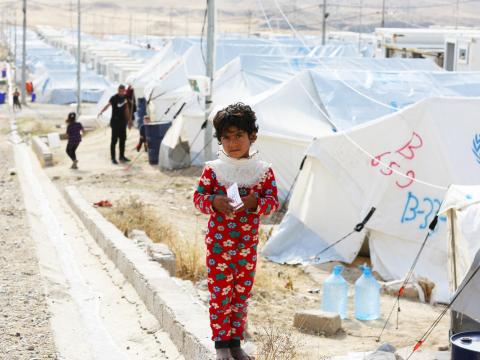World Vision to the Global Refugee Forum: child protection is “non-negotiable”

World Vision has warned that the international community must consider child protection as ‘non-negotiable’ when responding to the needs of refugees.
Despite many commitments made by the international community at the Global Refugee Forum, child protection is largely absent as a priority for Member States.
Speaking on the final day of the forum in Geneva, Switzerland, World Vision International President Andrew Morley welcomed a strong focus on Education and Early Child Development, which signalled a shift in global attitudes toward more long term solutions for children. However, he expressed concern that child protection as a sector was largely overlooked in the preparations for the event and by Member States in their pledging.
“As children represent 52% of refugees, discussions to boost child protection should have been top of the agenda at an event like this,” he said. “Protecting children is paramount, and non-negotiable. Refugee children face violence, exploitation, and abuse, yet currently less than 0.5% of all humanitarian budgets are spent on child protection.
“Children’s rights apply to all children regardless of their status. Much more still has to be done to protect the most vulnerable.”
World Vision, individually and in coalition, made a series of pledges covering Child Protection, Education, Jobs and Livelihoods, Faith and Humanitarian Action, and Cash-based programming to support children and their families from both the refugee and host community. All of these placed children at the centre of the Global Compact on Refugees.
Nathan McGibney, World Vision’s Humanitarian Policy and External Engagement Advisor said that, as pledges made at the Forum are analysed and summarised in the coming days and weeks, it is essential that all actors maintain momentum and collective action.
“Children on the move are not afforded a time to pause while conflicts and humanitarian crises rarely take time for reflection,” he said adding that displaced people should also be involved in finding solutions.
“Pledges have been made by the International Community, Civil Society, the Private Sector and other key stakeholders. Yet, the Global Compact on Refugees must not exist only at a global level; it is a process for refugees and by refugees and must reach every refugee and host community.”
The Global Refugee Forum represents the beginning of a long and collective process for the implementation of the Global Compact on Refugees and the commitments made by the international community. World Vision will continue to work across the world most complex humanitarian crises to ensure children are empowered to hold the international community to account on commitments made.
ENDS
Notes to Editor
- World Vision is a Christian humanitarian organisation conducting relief, development, and advocacy activities in its work with children, families, and their communities in nearly 100 countries to help them reach their full potential by tackling the causes of poverty and injustice. World Vision serves all people regardless of religion, race, ethnicity, or gender. For more information, visit www.wvi.org.